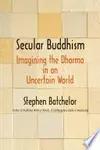
Eduardo Santiago

Tedious, exasperating, with a few gems embedded. Batchelor seems like a wonderful person, smart and compassionate and well grounded, but omg so pompous and so scattered.
Most of the essays assume a preexisting deep knowledge of Buddhist thought, like knowing the "First Discourse", and lots of names and terms. If you're coming at this with little or no knowledge of Buddhism, find something else. And if you're annoyed by language games, by a twentieth-century Anglo trying to wrest meaning from translations-of-translations of 2500-year-old texts and a cultural context that is impossible for us to imagine, give this a skip.
Good little nuggets about agnosticism, the (religionless!) ethical framework of the Buddha's teachings, and history, but for the most part this is just impenetrable handwaving. The essays are not ordered chronologically, or even in any meaningful order, so concepts he dismisses in an early essay (four "noble truths", religious aspects of Buddhism) are spoken of unquestioningly in later ones.
Tedious, exasperating, with a few gems embedded. Batchelor seems like a wonderful person, smart and compassionate and well grounded, but omg so pompous and so scattered.
Most of the essays assume a preexisting deep knowledge of Buddhist thought, like knowing the "First Discourse", and lots of names and terms. If you're coming at this with little or no knowledge of Buddhism, find something else. And if you're annoyed by language games, by a twentieth-century Anglo trying to wrest meaning from translations-of-translations of 2500-year-old texts and a cultural context that is impossible for us to imagine, give this a skip.
Good little nuggets about agnosticism, the (religionless!) ethical framework of the Buddha's teachings, and history, but for the most part this is just impenetrable handwaving. The essays are not ordered chronologically, or even in any meaningful order, so concepts he dismisses in an early essay (four "noble truths", religious aspects of Buddhism) are spoken of unquestioningly in later ones.